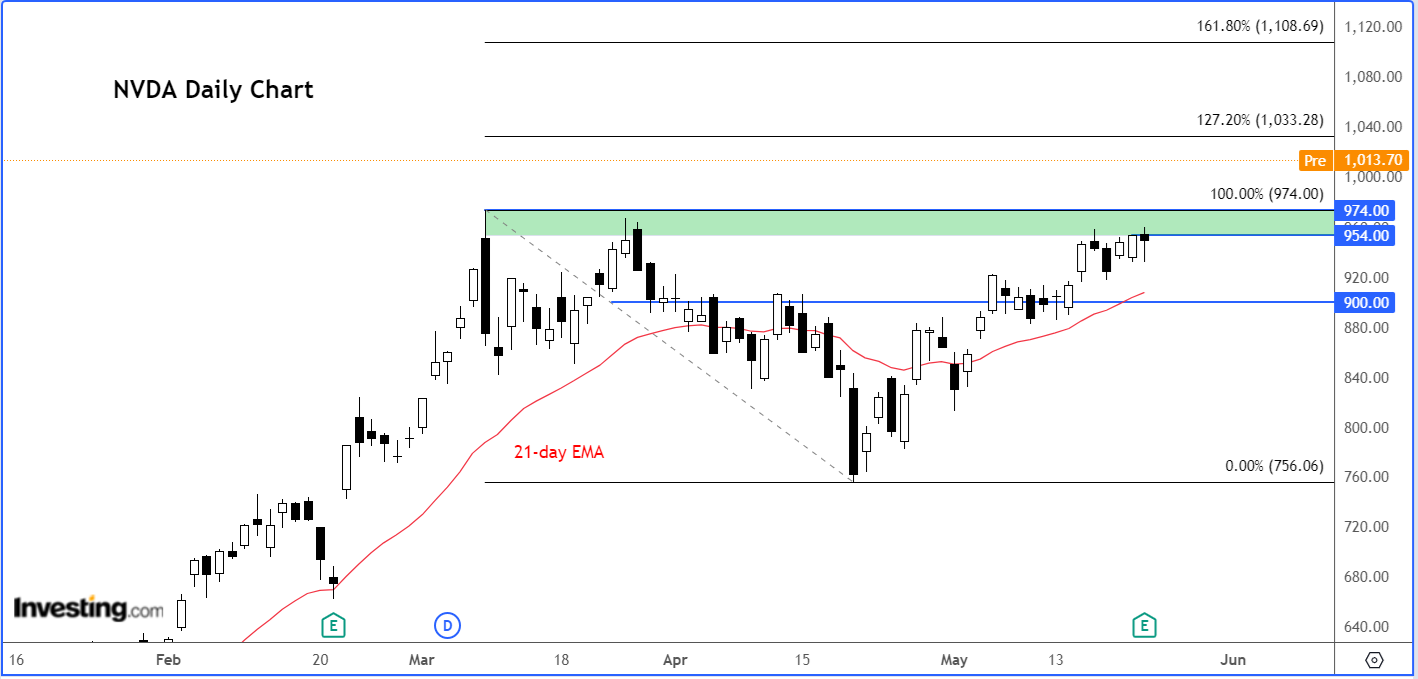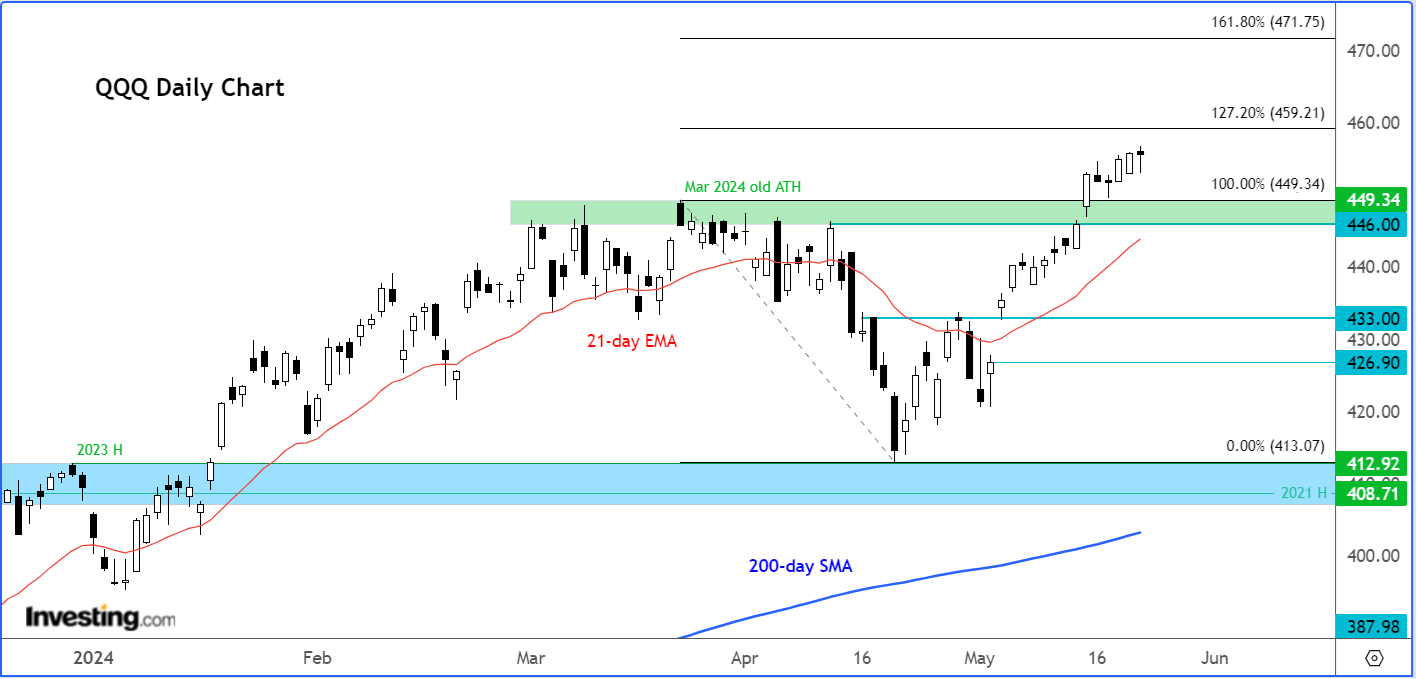- Nvidia's blowout earnings have lifted European shares and US futures.
- Nvidia and QQQ are poised to open at record highs despite hawkish Fed minutes.
- In this piece, we will look at some key levels to watch while trading the QQQ and Nvidia stock.
- Invest like the big funds for under $9/month with our AI-powered ProPicks stock selection tool. Learn more here>>
European shares and US index futures rose in early trade on Thursday, with the technology sector boosted by Nvidia's (NASDAQ:NVDA) earnings. The latest gains mean the Nasdaq is continuing to trade at new record highs with investors shrugging off hawkish Fed commentary and FOMC minutes. Dip-buying continues to be traders' preferred trading strategy.
Don't let your portfolio fall behind as markets look to scale new highs
Investors are optimistic after a strong earnings season, and indexes are looking to make new highs. Don't let your portfolio fall behind.
Our powerful AI stock-picking tool analyzes vast amounts of data to identify high-potential buys and sells before the market reacts.
For less than $9 a month, get a monthly update with our AI's curated selection of stocks primed for growth. Stay ahead of the curve and subscribe today!
Meanwhile, we have heard from a few Federal Reserve officials this week, all suggesting that interest rates may need to remain at these high levels for a longer period than previously anticipated to moderate demand and alleviate inflationary pressures.
Still, the lack of any major bearish catalysts could keep the downside limited.
Nvidia set to open at new record following earnings beat
Index futures rose further overnight following Nvidia’s solid results after the market’s close, which may well have some positive impact on risk sentiment today. The stock is set to open at a new record high and given how big an influence it has on the direction of the Nasdaq, it would be a crime not to watch Nvidia shares when trading QQQ.
Investors focused on the 10-to-1 stock split, which means reduced price and more shares outstanding, making it more affordable for investors to buy its shares. Where the stock trades and whether it holds the gains could have a big influence on the direction of US indexes today.

NVDA needs to hold above prior resistance in the range between 954.00 and 974.00 to maintain a bullish bias in the short-term outlook.
QQQ technical analysis and trade ideas
The QQQ, which is an ETF designed to track the performance of the Nasdaq 100, is continuing to make new highs, sitting comfortably above its 21-day exponential moving average. So, the trend is clearly bullish, making it a dip-buying market rather than one to short.

As QQQ is trading at record highs, there are no prior reference points to use as targets. So, on the chart, I have plotted the Fibonacci extension levels of the last significant downward movement that took place in March. The 127.2% extension of that downswing comes in at 459.21 while the 161.8% level comes in at 471.75. These are now my next bullish objectives for QQQ.
Now QQQ is set to open with a gap, following Nvidia’s after-hours shares surge. Incidentally, the futures market indicates an open around the 127.2% extension level of 459.21.
It will be interesting to see how the markets will close today’s session. If QQQ ends lower, but around Wednesday’s close of 455.71, then this will not bother the bulls much. Even if it closes slightly below this level of say 454.69, which marks last week’s high, this will still maintain the technical bullish bias.
However, any close below here, could pave the way for follow-up selling pressure in the days ahead, which could see QQQ go for a retest of the old record high from March at 449.4 and possibly dip to the next support around 446.00.
Hawkish FOMC minutes should be taken with a pinch of salt
The hawkish minutes from the FOMC’s May 1 meeting that were released yesterday initially weighed on stocks as they surprised on the hawkish side. While the consensus was that the policy was "well positioned," numerous members were open to additional rate hikes if necessary.
Notably, several participants expressed doubts about whether the policy was sufficiently restrictive. However, this perspective must be considered in light of the strong inflation and job market data from March. Despite more encouraging data in April, some hawkish members, such as Neel Kashkari and Chris Waller, continued to express concerns about inflation.
However, it is reasonable to assume that the overall sentiment of the FOMC has become somewhat less hawkish since the May meeting, given the deterioration we have seen in recent data releases. That’s probably how stock market investors viewed the FOMC minutes as they once again bought the dip into the close.
Economic data highlights include PMIs, jobless claims, and new home sales
On the economic calendar, PMIs dominate the agenda. We have already seen better-than-expected manufacturing PMIs from the Eurozone and the UK, while services PMIs were a little softer. That said, German services PMIs beat expectations, rising to their highest point since last June. The PMI data has further alleviated growth concerns over Europe, providing mild support to European shares.
The S&P Global US manufacturing PMI is expected to print an unchanged 50.0 reading for May, while the services PMI is also expected to show little deviation from the previous print of 51.3. After the jobless claims data, today’s other data highlights include new home sales and the Kansas City Fed Manufacturing Activity survey.
We have seen several weaker US macro pointers since April's nonfarm jobs report was released earlier this month. Subsequent data releases have mostly fallen short of expectations, signaling a slowing US economic recovery. That trend continued on Wednesday with existing home sales coming in much weaker and crude oil inventories showing a surprise build.
This month's other disappointing economic reports include the forward-looking ISM manufacturing and services PMIs, as well as data on retail sales, building permits, and housing starts. Even the latest inflation data came in slightly cooler.
Thus, if the trend of weaker macro data continues, then this could lead to lower inflation and lessen the need for prolonged tight monetary policy. In turn, that could keep stocks supported for a bit longer, even at these overstretched levels.
***
Be sure to check out InvestingPro to stay in sync with the market trend and what it means for your trading. As with any investment, it's crucial to research extensively before making any decisions.
InvestingPro empowers investors to make informed decisions by providing a comprehensive analysis of undervalued stocks with the potential for significant upside in the market.
Subscribe here for under $9/month and never miss a bull market again!

Disclaimer: This article is written for informational purposes only; it does not constitute a solicitation, offer, advice, or recommendation to invest as such it is not intended to incentivize the purchase of assets in any way. I would like to remind you that any type of asset, is evaluated from multiple points of view and is highly risky and therefore, any investment decision and the associated risk remains with the investor.
